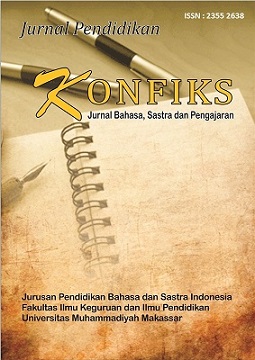REPRESENTATION OF GOVERNMENT IDEOLOGY IN LAW ON SEXUAL VIOLENCE CRIMINAL ACTS NUMBER 12 OF 2022: A CRITICAL DISCOURSE ANALYSIS STUDY
DOI: https://doi.org/10.26618/kfdp5w08
Abstract
Legal texts function not only as normative instruments but also as discursive products containing power relations and state ideology. Therefore, to critically understand the representation of government ideology in Law Number 12 of 2022 concerning Criminal Acts of Sexual Violence (UU TPKS), a discourse study was conducted using Norman Fairclough's Critical Discourse Analysis (AWK) approach. The analysis was conducted through three dimensions: text, discourse practices, and socio-cultural practices. This research employed a qualitative method with an ethnographic approach to legal texts. The data sources used consisted of primary data, namely Law Number 12 of 2022 concerning Criminal Acts of Sexual Violence, and secondary data sources in the form of literature related to the representation of ideology in discourse through Fairclough's critical discourse analysis. In the text dimension, M.A.K. Halliday's systemic functional linguistics theory, particularly ideational metafunctions through transitivity systems, is used to examine the representation of actions, actors, and events in key articles of the TPKS Law. The analysis of discourse practices highlights the processes of production and consumption of legal texts, while socio-cultural practices are traced through the historical, political, and ideological contexts behind their formation. The results of the study indicate that: (1) the linguistic structure of the TPKS Law frames the state as the dominant protective actor, while women tend to be represented passively; (2) the discourse practices of this law demonstrate a tug-of-war between the progressive ideology of civil society and conservative pressures from state actors and religious groups; (3) the socio-cultural context of the TPKS Law is influenced by patriarchal culture, electoral political calculations, and global demands. This study emphasizes the importance of critical evaluation of legal language in public policy, particularly regarding issues of sexual violence and gender inequality.
Downloads
Published
Issue
Section
License

This work is licensed under a Creative Commons Attribution 4.0 International License.
Authors who publish with this journal agree to the following terms:
The author owns the copyright and grants the journal rights for first publication with the work simultaneously licensed under a Creative Commons Attribution License which allows others to share the work with acknowledgment of the work's authorship and initial publication in this journal.
Authors may enter into separate additional contractual agreements for the non-exclusive distribution of the published journal version of the work (for example, posting it to an institutional repository or publishing it in a book), with acknowledgment of its initial publication in this journal.
Authors are permitted and encouraged to post their work online (for example, in institutional repositories or on their websites) before and during the submission process, as this can lead to productive exchanges, as well as earlier and larger citations of published work (See The Effect of Open Access).
Statement of Authenticity and Manuscript Copyright can be downloaded: Here
After filling in the statement letter, please send via e-mail: konfiks@unismuh.ac.id





.png)


